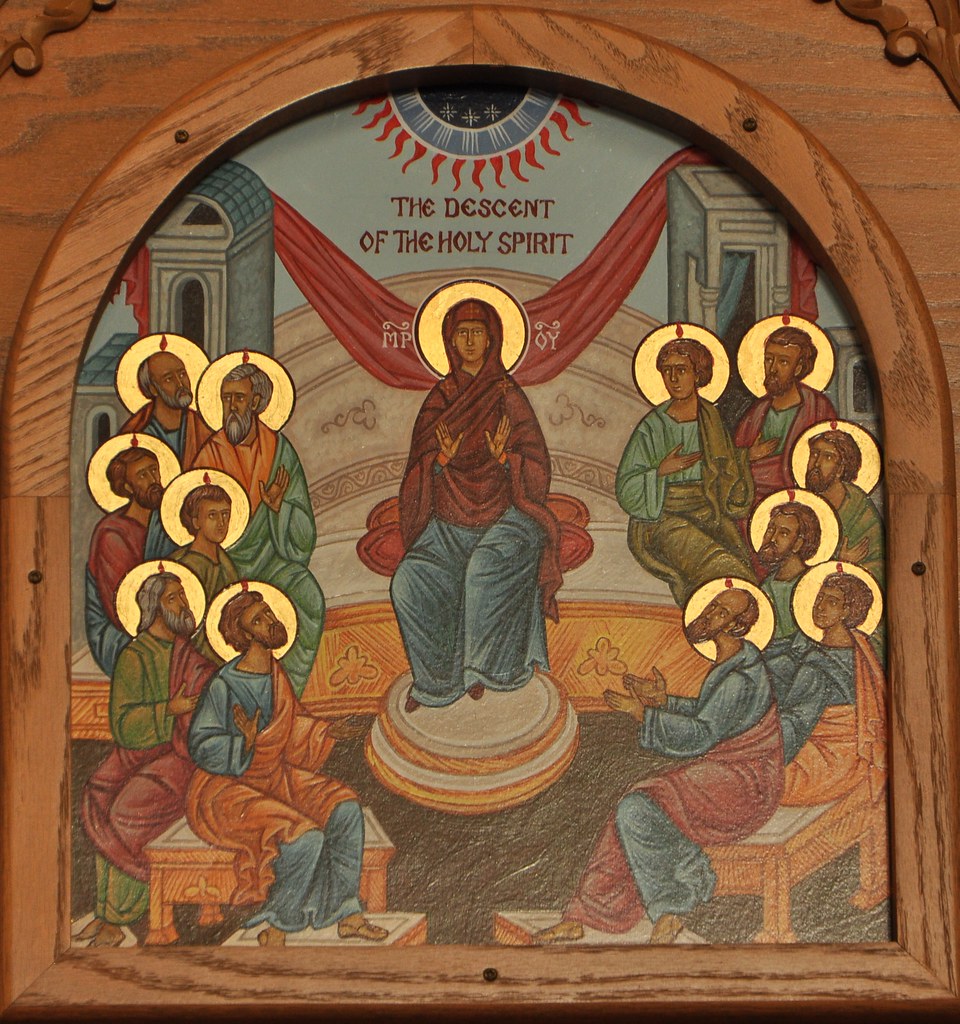Pentecost
This well-spread-out series of posts is all about Jesus having the roles of God and humanity at the same time. So why on earth am I slipping in a post about Pentecost? Surely that’s not Jesus’ gig.

Shared on a Creative Commons licence
Jesus is our example
The inclusion of Pentecost in a series about Jesus being fully God and fully human is absolutely crucial. It mirrors the Spirit descending upon Jesus at his baptism. These are the sole instances where the Holy Spirit is portrayed with a tangible presence: Jesus’ baptism and the outpouring upon the disciples at Pentecost.
21 Now when all the people were baptized, and when Jesus also had been baptized and was praying, the heavens were opened, 22 and the Holy Spirit descended on him in bodily form, like a dove; and a voice came from heaven, “You are my beloved Son; with you I am well pleased.”
Luke 3:21:23 ESVUK
Jesus’ baptism wasn’t just any old dip in the water. It was like a big advertising board saying, “I’m the Messiah.” He was showing everyone that he’s here to take on the whole human experience and save the day. It’s like the ultimate superhero origin story, but with more water and less spandex.
The baptism of Jesus signified the start of his ministry as the Messiah. Contrary to the expectations of many Jewish people, he was not the warrior king who would overthrow the Roman invaders. Instead, in his baptism, Jesus embraced the role of the suffering servant who would bring healing to his people through his own suffering and death. By waiting for the Holy Spirit to descend upon him before commencing his ministry, Jesus set an example for us, demonstrating the need for the Holy Spirit in carrying out God’s work. This work focuses on healing rather than conquest, showcasing a path of hope and renewal.
Jesus is our teacher
The teaching I am using comes from Paul, not Jesus, but I’m using the same headings as the rest of the series.
Throughout the letter to the Romans, Paul eloquently discusses the concept of spirit. Whether referencing the human spirit or God’s Holy Spirit, the word remains consistent. It’s worth noting that the capitalization we attribute to God’s Spirit is not present in the early Greek of the New Testament, as it was written entirely in uppercase letters.
Romans chapter 8, mentions Spirit/spirit 22 times in the first 27 verses. That’s a lot. In the ESV version of the Bible they all have a capital S to point to God’s Holy Spirit, following the conventions of Bible translation. But how do they know? Look at verse 27:
And he who searches hearts knows what is the mind of the Spirit, because the Spirit intercedes for the saints according to the will of God.
Romans 8: 27 ESV
The intertwining of Spirit and spirit in this passage implicates a crucial exploration of the human heart. It seems rational to infer that, despite the capitalization in most English translations, the first mention pertains to the human spirit. However, such distinctions are often elusive, both in a literary context and in the personal experience of Christians. The indwelling of the Holy Spirit within our own spirits blurs the lines, making it challenging to discern which is in action at any given moment. The convergence is palpable.
I must confess, I have not reached that point yet. My ego still obstructs my progress all too often, and much of the theological discourse in churches fails to acknowledge the difficulties of navigating the world as an autistic individual in a predominantly neurotypical society. If Jesus embraces individuals as they are, why am I not allowed to be true to myself?
The Godhead and humanity intertwined
Some theologians suggest that Jesus was baptized to empathize with ordinary people. However, I respectfully disagree. Jesus was already fully human, and I believe that dwelling on his divinity alone oversimplifies his complex nature. I firmly hold the belief that Jesus was both fully human and fully God, intricately integrated without clear boundaries between the two. It’s akin to discerning which part of a cake is the egg – an inseparable unity.
We do not need to juggle the roles of being in the world and the Kingdom of God silmultaneously. We need to live what we are. We have God, in the form of his Holy Spirit, inside us.
Incarnation – Epiphany – The baptism of Jesus – Temptation – Good Friday – Easter – Ascension – Pentecost – Trinity – The Return (advent 2024)
